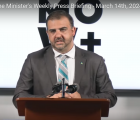
Composite Image: Fred Smith, QC (left) and Romauld Ferreira.
Two leading attorneys and a fast-growing environmental movement today raised their cry and strengthened their call for legislation that would effectively end closed door deal-making between governments and private developers.
“For far too long, we have been the unwitting and uninformed victims of decisions made by various governments who have locked the public out of the decision-making process,” said Fred Smith, QC, managing partner at Callenders law firm, Grand Bahama, and outspoken environmentalist.
“The public’s right to know is one of the most basic tenets of a democracy, yet in The Bahamas, the people who live in a community are often not advised of a project, resort or other development in their own back yard. They may hear rumours but they don’t have an opportunity to comment or express how they feel about a proposed project, even if it is one that could change their entire way of life. They are simply left out of the process and then they wake up one day and there’s a picture in the paper of a contract signing or a grinning prime minister or cabinet member, a developer and an announcement.”
Only one thing, said Smith, will make the public a part of the decision-making process and that is a Freedom of Information Act. It would also give the public the right to access information about political campaign donations from non-Bahamians, he said.
“The time for The Bahamas to meet the standards of transparency that exists in almost every other country in the world is now. We have talked about this long enough, debated it hotly enough. There is no need to talk any longer. It is time to act. The Bahamas must pass a Freedom of Information Act without further delay. The public has a right to know – to know what is being planned that could affect them, what is being approved that could impact the environment, what is being donated to political campaigns by people who do not have the right to vote but may at some later time need a favour. We are not saying that every campaign donation is suspicious. What we are saying is that the public has a right to know.”
Smith’s impassioned plea was inspired in part by recent events in Bimini where a transportation support system could deliver up to 3,000 passengers a day to a new casino, an opportunity some residents viewed as a potential economic boost to the island in the northern Bahamas and others felt would change the quality of life forever, stress resources and overload the small isle with a population of 1500. He was also responding to news of the possibility of a stem cell research (treatment?) facility being considered for the exclusive residential community of Lyford Cay. That facility — and the re-zoning it would require or the exemption from current zoning — is being requested by fashion mogul and Lyford Cay resident Peter Nygard who has donated funds to the current government, though the extent of donations is not clear. Nygard has advertised $250,0000; other headlines have indicated 20 times that amount.
The well-known attorney’s comments were echoed by another leading lawyer, environmental attorney and consultant Romauld Ferreira.
“A Freedom of Information Act will finally put the Bahamian on equal footing with your government,” said Ferreira. “It is the public’s right to access documents, the public’s right to know what decisions are being made or considered, decisions that affect them. A Freedom of Information Act is the ensures transparency, openness and participation and it is participation in the decision-making process that is the bedrock of democracy.”
A Freedom of Information Act is one of the basic tenets of Save The Bays, the quickly-growing environmental movement that is calling for passage of the long-proposed legislation along with passage of an environmental protection act. The organisation is nearing 5,000 signatures on a petition calling for both pieces of legislation and an end to unregulated development.





